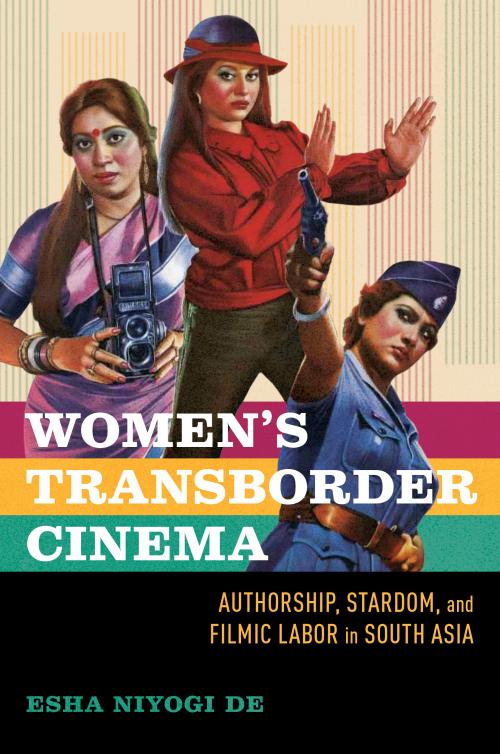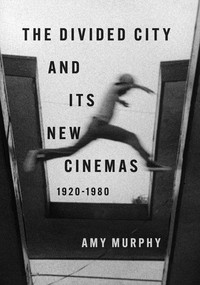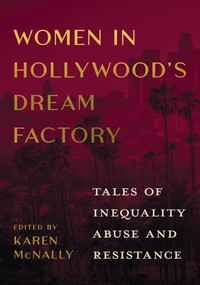
Women's Transborder Cinema
Authorship, Stardom, and Filmic Labor in South Asia
Comparing the creative labors of South Asia’s women filmmakers
Cloth – $125
978-0-252-04620-9
Paper – $32
978-0-252-08828-5
eBook – $19.95
978-0-252-04747-3
Publication Date
Cloth: 12/10/2024
Series: Women’s Media History Now!
About the Book
Can we write women’s authorial roles into the history of industrial cinema in South Asia? How can we understand women’s creative authority and access to the film business infrastructure in this postcolonial region? Esha Niyogi De draws on rare archival and oral sources to explore these questions from a uniquely comparative perspective, delving into examples of women holding influential positions as stars, directors, and producers across the film industries in India, Pakistan, and Bangladesh.De uses film tropes to examine the ways women directors and film entrepreneurs claim creative control within the contexts of anti-colonial nationalism and global capitalism. The region’s fictional cinemas have become staging grounds for postcolonialism, with colonial and local hierarchies merged into new imperial formations. De’s analysis shows how the gendered intersections of inequity and opportunity shape women’s fiction filmmaking while illuminating the impact of state and market formations on the process.Innovative and essential, Women’s Transborder Cinema examines the works of South Asia’s women filmmakers from a regional perspective.
About the Author
Esha Niyogi De is a senior lecturer in the Writings Programs division at the University of California, Los Angeles. She is the coeditor of South Asian Filmscapes: Transregional Encounters and author of Empire, Media, and the Autonomous Woman: A Feminist Critique of Postcolonial Thought.Reviews
“Building on earlier analyses in feminist film studies, refusing disciplinary theoretical and methodological closure, and engaging womens’ experiences in the industry both on and off screen allows De to tell the story of women in South Asian cinema in a manner both fresh and instructive. De challenges stereotypes of Muslim women (especially in Pakistani cinema), where they are often cast as victims or simply objects of the male gaze, instead underscoring women’s agency as both makers of and actors in film.” --Critical Pakistan Studies, Shahnaz Rouse“Most of all, what this book reveals is that a transregional analytic approach can be excellent at uncovering local, regional, national, as well as transnational dynamics.…Niyogi De makes an important contribution to the cultural history of South Asian women’s filmic creativity and entrepreneurship through this book.”--The Book Review Literary Trust, Barnita Bagchi
"One of the great strengths of Women’s Transborder Cinema is De’s refusal to rely on dominant theoretical models. By building an anthropological historiography of women’s filmmaking across South Asia — drawing from oral history, production anecdotes, informal economies, and star-publicity as labor – De opens up a rich archive of minor cinematic cultures."--South Asian Review, Salman Rafique
“De’s crucial point of departure is the opening up of anachronistic notions of authorship to a broader understanding of creative labour in film. . . . The merit of Women’s Transborder Cinema is to prove with hard, undisputable evidence that women do make movies, and that what needs changing, first and foremost, is the lens through which we recognise, identify and value women’s creative input.”--Screen, Valentina Vitali
Blurbs
“This is a pathbreaking book on female authorship and filmic labor. It brings together submerged archives and hidden voices of women producers and directors from India, Bangladesh, and Pakistan. A unique contribution to scholarship on South Asian aesthetics and cinema.”--Kamran Asdar Ali, coauthor of Gender, Politics, and Performance in South Asia
“An easy-to-read and easily approachable text that examines an impressive variety of rare documents to elaborate upon its theoretical ideas. De’s findings about the female stars-producers-directors create a revisionist and feminist history of cinema.”--Madhuja Mukherjee, coeditor of Industrial Networks and Cinemas of India: Shooting Stars, Shifting Geographies and Multiplying Media










